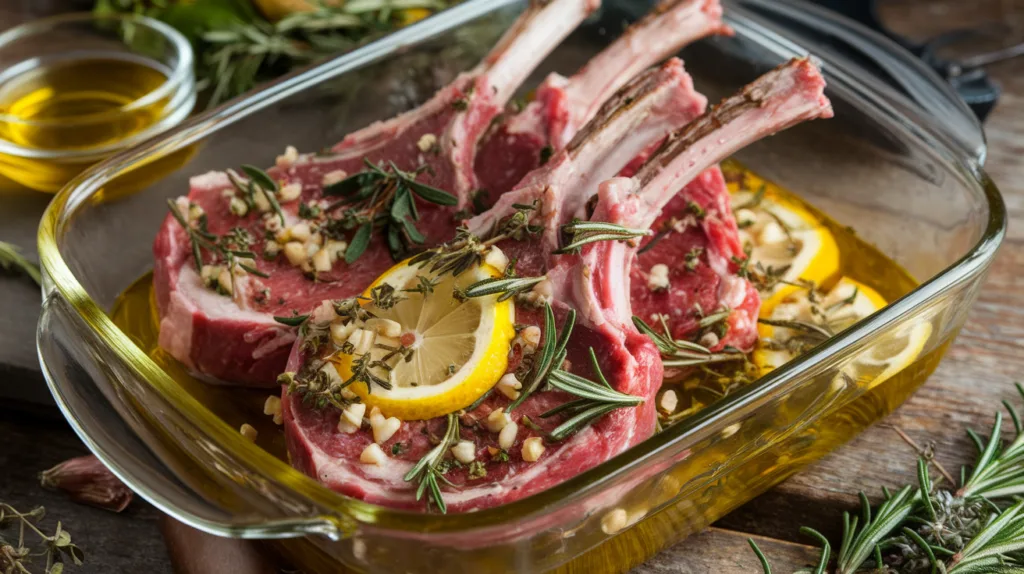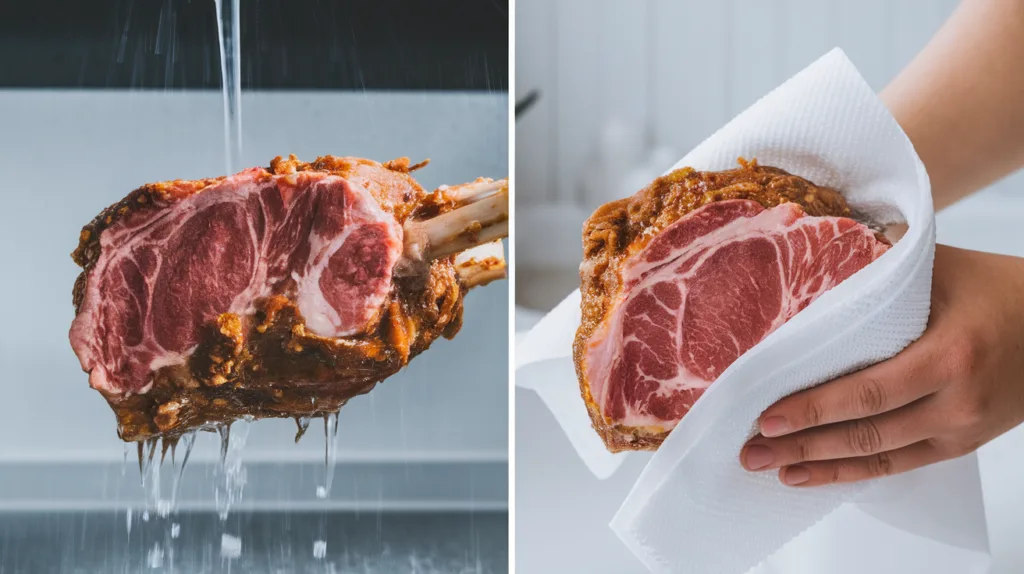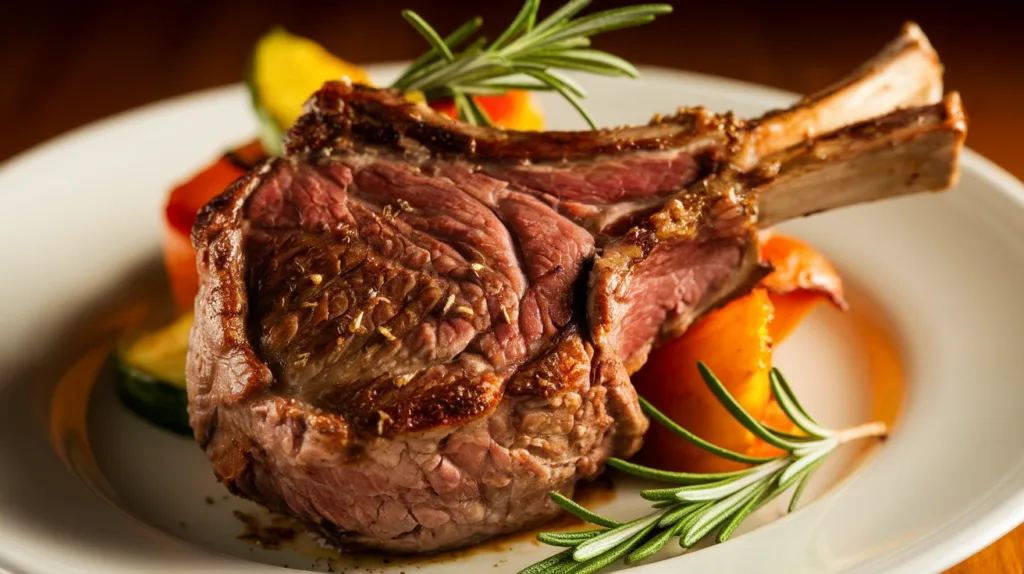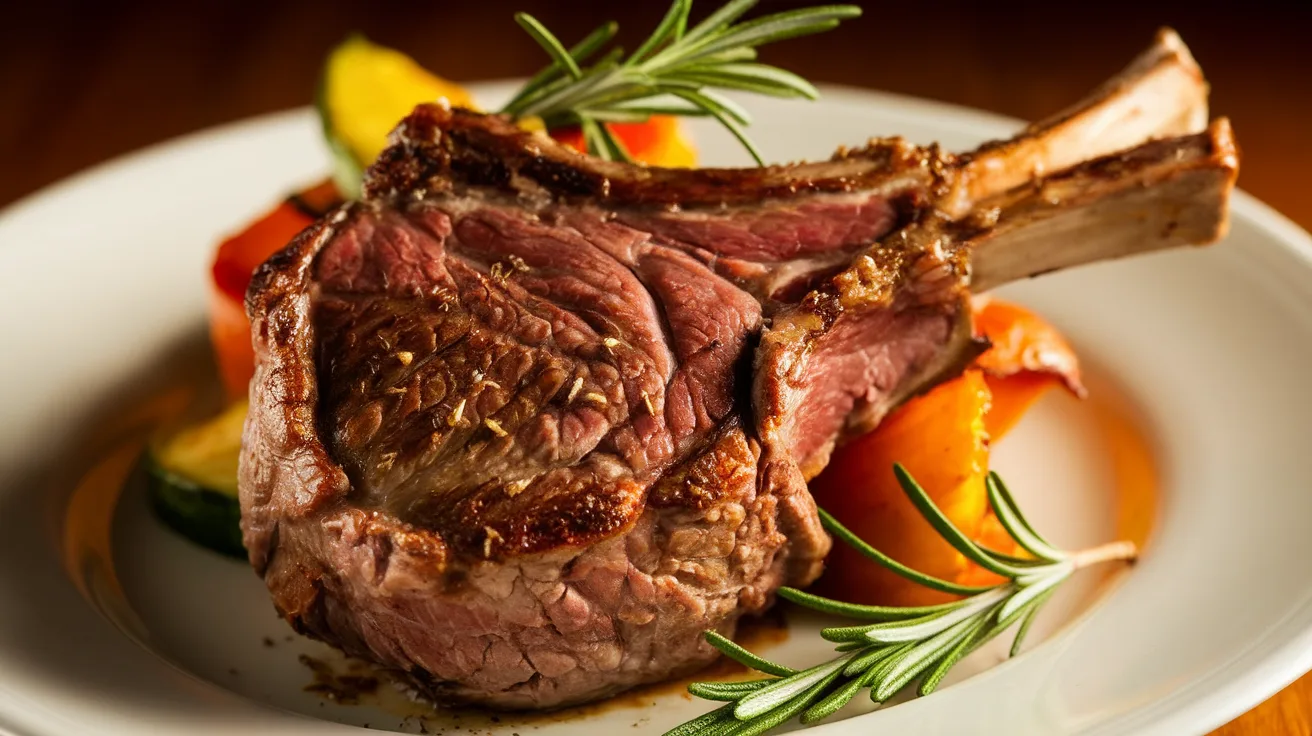Introduction

Cooking lamb is an art, and marination plays a key role in elevating its natural flavors. A well-prepared marinade can transform lamb into a tender, flavorful masterpiece, whether it’s destined for a grill, a slow roast, or a pan-sear. But when it comes to handling the marinated lamb before cooking, many are left puzzled by one critical question: “Should I rinse the marinade off lamb before cooking it?”
This question isn’t just about technique—it can impact the flavor, texture, and safety of the dish. While some chefs recommend rinsing off excess marinade for a cleaner finish, others argue that it strips away precious flavor. The right approach often depends on your cooking method, the ingredients in the marinade, and your personal preferences.
In this article, we’ll explore every aspect of lamb marination to help you make an informed decision. From the science behind marinades to practical tips for preparation, you’ll learn how to achieve the perfect balance of flavor and texture without compromising on safety or quality.
Whether you’re a seasoned cook or a curious beginner, this comprehensive guide will answer all your questions about lamb marination. Let’s unravel the mystery and make your next lamb dish truly unforgettable.
Understanding Lamb Marination
Marination is more than just a cooking technique; it’s a culinary tradition that enhances flavor, tenderness, and aroma. When it comes to lamb, marination serves as a crucial step to soften its robust flavor profile and infuse it with complementary tastes. Let’s take a closer look at what marination is and why it’s essential for lamb.
What Is Marination?
Marination involves soaking meat, like lamb, in a seasoned liquid mixture to enhance its flavor and texture. This liquid, known as a marinade, typically contains a blend of ingredients designed to penetrate the meat and tenderize it. The process often takes several hours or even overnight to allow the flavors to meld and infuse deeply into the meat fibers.
Benefits of Marinating Lamb
- Flavor Infusion: Marinades are packed with herbs, spices, and acidic components that seep into the meat, enriching its taste.
- Tenderization: Acidic ingredients like lemon juice, yogurt, or vinegar break down muscle fibers, making the meat more tender and juicy.
- Aroma Enhancement: Fresh herbs, garlic, and spices in marinades impart a mouthwatering aroma that elevates the overall dining experience.
- Moisture Retention: Oil and other liquid components help retain moisture during cooking, preventing the lamb from drying out.
Common Ingredients in Lamb Marinades
A good marinade strikes a balance between flavors and acidity. Here are some typical components:
- Acidic Elements: Lemon juice, lime juice, yogurt, wine, or vinegar help tenderize the meat.
- Herbs and Spices: Rosemary, thyme, mint, cumin, and coriander are popular choices for complementing lamb’s natural flavor.
- Oil: Olive oil or other neutral oils serve as a base, helping to distribute flavors evenly and lock in moisture.
- Savory Additions: Garlic, onions, soy sauce, or Worcestershire sauce add depth and complexity to the marinade.
- Sweeteners: Honey, brown sugar, or molasses balance the acidity and create a subtle caramelization during cooking.
How Long Should You Marinate Lamb?
The duration of marination depends on the cut and size of the lamb. Generally:
- Small cuts or chops: 2-4 hours.
- Larger cuts like leg or shoulder: 6-12 hours, or even overnight for maximum flavor penetration.
Keep in mind that over-marinating can break down the texture excessively, resulting in mushy meat. Always follow a recipe or guidelines to ensure the best outcome.
With a solid understanding of marination, the next step is addressing the critical question: should you rinse the marinade off lamb before cooking? Let’s tackle this debate in the following section.
Do I Rinse Marinade Off Lamb or Not?

The question of whether to rinse marinade off lamb sparks considerable debate among chefs and home cooks alike. The decision hinges on a few key factors, including the type of marinade, the cooking method, and your desired flavor profile. Here, we’ll explore the arguments for and against rinsing to help you make an informed choice.
Why Should You Rinse Marinade Off Lamb?
Rinsing off excess marinade can be beneficial in certain circumstances. Here are some reasons you might consider rinsing:
- Preventing Burnt Residue: Sugary marinades, such as those containing honey or brown sugar, can burn quickly during high-heat cooking like grilling or pan-searing. Rinsing can minimize the risk of unpleasant burnt flavors.
- Controlling Saltiness: If the marinade contains a lot of soy sauce or other salty ingredients, rinsing can help reduce excessive saltiness, ensuring a more balanced flavor.
- Cleaner Appearance: Rinsing removes residual herbs or spices that might char or stick unattractively during cooking.
Cons of Rinsing Off Marinade
On the other hand, rinsing marinade off lamb comes with its own drawbacks:
- Loss of Flavor: Rinsing can strip away surface flavors that have been carefully developed in the marinade.
- Texture Impact: The residual marinade often helps create a rich crust during cooking, which can be lost if rinsed away.
- Extra Steps: Rinsing requires additional time and effort, not to mention potential water waste.
Factors to Consider
Deciding whether to rinse marinade off lamb depends on several factors:
- Type of Marinade: Acidic or savory marinades typically don’t require rinsing, but sugary ones may benefit from a quick rinse to avoid burning.
- Cooking Method: For methods like grilling or pan-searing, you may opt to rinse or at least pat the lamb dry to reduce splatter and charred bits. For slow cooking or roasting, leaving the marinade intact often enhances flavor.
- Health and Safety: If you’re concerned about raw marinade carrying bacteria, proper cooking techniques (reaching the correct internal temperature) will mitigate this risk.
Best Practices
If you choose to rinse, here’s how to do it effectively:
- Place the lamb under cool running water for a few seconds.
- Use your hands to gently remove excess marinade.
- Pat the lamb dry with paper towels to ensure even cooking.
For those who prefer not to rinse, blotting off excess marinade with a paper towel can be a good alternative, ensuring the lamb is not overly wet before it hits the heat.
Ultimately, the choice is yours, and it depends on the specifics of your dish. In the next section, we’ll discuss scenarios where rinsing might be necessary and how to do it properly.
When Should You Rinse Marinade Off Lamb?
While rinsing lamb after marination is generally a matter of preference, there are specific scenarios where rinsing becomes a necessary step. Understanding these situations can help you achieve the best possible flavor, texture, and safety for your dish.
Overly Salty Marinades
Sometimes, a marinade can become overly salty, particularly if it includes ingredients like soy sauce, Worcestershire sauce, or fish sauce. Rinsing the lamb under cool water can help wash away some of the excess salt and ensure the flavor isn’t overwhelming. Be sure to pat the lamb dry afterward to prepare it for cooking.
Health and Safety Concerns
If the marinade has been sitting at room temperature or has been in contact with raw ingredients for an extended period, rinsing may reduce the risk of bacteria transferring to the surface of the meat. Although proper cooking temperatures will kill bacteria, rinsing can provide an additional layer of reassurance.
Removing Sugary Residue
Sugary marinades, while delicious, are prone to burning when exposed to high heat. If you plan to grill or pan-sear the lamb, rinsing off the marinade can help prevent the sugars from caramelizing too quickly and leaving a bitter taste. A light rinse followed by blotting the lamb dry will allow you to cook it more evenly.
Reducing Spiciness
If your marinade includes an excessive amount of chili, pepper, or other spicy ingredients, rinsing can help tone down the heat. This is especially useful when cooking for guests who may not enjoy overly spicy food.
How to Rinse Properly
If you’ve decided rinsing is necessary, here’s the best way to do it:
- Place the lamb under a steady stream of cool water in the sink.
- Use your hands or a soft sponge to gently remove the excess marinade.
- Ensure you rinse only briefly to avoid washing away too much flavor.
- Pat the lamb thoroughly dry with paper towels before proceeding to cook.
When Not to Rinse
In some cases, rinsing is not necessary. For example, acidic or herb-based marinades that complement the dish are often better left on the lamb. In such cases, blotting the meat with a towel to remove excess moisture is a better alternative.
In the next section, we’ll explore alternatives to rinsing, including simple techniques to handle marinated lamb without sacrificing flavor or texture.
Alternatives to Rinsing Marinade Off Lamb
If you’re hesitant to rinse marinade off lamb due to concerns about losing flavor or moisture, there are several effective alternatives. These techniques allow you to manage excess marinade while retaining the richness and depth it adds to the meat.
Blotting Excess Marinade
One of the simplest methods to handle excess marinade is blotting. Here’s how:
- Use a clean paper towel or a lint-free kitchen cloth.
- Gently press the lamb to absorb any excess liquid, being careful not to wipe away the marinade completely.
- This approach helps remove just enough moisture to prevent splattering during cooking while preserving flavor.
Blotting works particularly well for marinades that are heavy on oil or liquid but don’t contain ingredients prone to burning, such as sugar.
Cooking with the Marinade Intact
In many cases, leaving the marinade on the lamb and incorporating it into the cooking process is a great option. Here’s why:
- Enhanced Flavor: Allowing the marinade to cook with the lamb helps deepen the flavors as the heat releases the essence of the herbs and spices.
- Moisture Retention: The residual marinade can act as a protective layer, keeping the lamb juicy during cooking.
If you’re using this method, ensure the marinade components (such as garlic or herbs) don’t burn by using medium to low heat or basting regularly.
Scraping Off Excess Marinade
If you’re concerned about certain marinade ingredients burning, another alternative is to scrape off the visible chunks. This method works well for marinades with solid components like minced garlic, chopped herbs, or crushed spices.
Here’s how to do it:
- Use the edge of a knife or a spoon to gently remove larger pieces of marinade.
- Leave a thin layer of liquid or oil-based marinade to keep the lamb moist.
This approach allows you to retain the flavor while avoiding burnt bits that could affect the taste.
Adjusting Cooking Techniques
Your cooking method can also help manage excess marinade. Consider these tips:
- Grilling: Preheat the grill well to sear the lamb quickly and prevent sticking. Use indirect heat if the marinade contains sugary components.
- Roasting: Place the lamb on a rack in the oven to allow any excess marinade to drip away without affecting the texture.
- Slow Cooking: When slow-cooking lamb, leaving the marinade intact often enhances the dish’s flavor and integrates well with the juices.
Benefits of Avoiding Rinsing
By choosing alternatives to rinsing, you can:
- Maximize the flavor profile of the dish.
- Preserve the natural juiciness of the lamb.
- Save water and minimize waste in the kitchen.
These alternatives are versatile and adaptable to various recipes and cooking styles, ensuring you achieve the desired results without rinsing. In the next section, we’ll discuss how to prepare and cook lamb after marination for optimal flavor and texture.
Cooking Marinated Lamb: Tips for Best Results

Once your lamb is marinated and ready to cook, the preparation and cooking techniques you choose will have a significant impact on the final flavor and texture. Proper handling ensures that the marinade works harmoniously with the lamb, resulting in a succulent and flavorful dish. Let’s dive into the steps for cooking marinated lamb to perfection.
Preparing Marinated Lamb for Cooking
After marination, it’s important to prepare the lamb for the cooking process. Here are some essential steps to follow:
- Pat Dry If Necessary: Use a paper towel to blot the surface gently, especially if the marinade is overly wet or contains sugary ingredients that might burn.
- Bring to Room Temperature: Allow the lamb to sit at room temperature for 20–30 minutes before cooking. This helps the meat cook evenly.
- Season Lightly: Depending on the marinade, you may want to add a touch of salt or pepper to enhance the flavor profile further.
Internal Temperature Guidelines
Cooking lamb to the correct internal temperature ensures safety and optimal texture. Use a meat thermometer to check doneness:
- Rare: 125°F (52°C) – cool red center.
- Medium Rare: 135°F (57°C) – warm red center.
- Medium: 145°F (63°C) – warm pink center.
- Well Done: 160°F (71°C) – little to no pink.
Tips for Retaining Flavor and Texture
Here are additional tips to make your marinated lamb dish stand out:
- Baste While Cooking: Use the reserved marinade to baste the lamb occasionally for added moisture and flavor. Ensure the marinade is cooked thoroughly if it has been in contact with raw meat.
- Rest the Lamb: After cooking, let the lamb rest for 5–10 minutes. This allows the juices to redistribute, resulting in a tender and juicy bite.
- Pair with Complementary Sides: Serve the lamb with sides like roasted vegetables, couscous, or a fresh herb salad to complete the meal.
By following these cooking tips, you’ll unlock the full potential of your marinated lamb, ensuring a dish that’s bursting with flavor and perfectly cooked. In the next section, we’ll discuss common mistakes to avoid when marinating and cooking lamb.
FAQs: Should You Rinse Marinade Off Lamb?
Here are answers to some frequently asked questions about marinating lamb to help clarify common doubts and ensure success in your culinary endeavors.
1. How long should lamb be marinated?
The ideal marination time depends on the cut of lamb and the type of marinade. Smaller cuts, such as chops, can be marinated for 2–4 hours, while larger cuts, like a leg or shoulder, benefit from 6–12 hours. Avoid marinating for too long, as overly acidic marinades can break down the texture and make the meat mushy.
2. Should I rinse marinade off lamb before cooking?
It depends on the situation. Rinse if the marinade is overly salty, sugary, or has strong raw flavors that may burn or overpower the dish. Alternatively, blotting or scraping excess marinade works well to retain flavor while preparing the lamb for cooking.
3. Can you cook lamb in its marinade?
Yes, you can cook lamb in its marinade, but ensure the marinade is cooked thoroughly to eliminate any bacteria from contact with raw meat. Use it as a basting liquid or sauce for added flavor.
4. What are the best ingredients for lamb marinade?
Great marinades for lamb often include acidic components like lemon juice or yogurt, fresh herbs such as rosemary and thyme, garlic, olive oil, and complementary spices like cumin or paprika. Balance flavors with a touch of sweetness from honey or brown sugar if desired.
5. Does marinating always make lamb tender?
Marinating can help tenderize lamb, but the effectiveness depends on the marinade’s acidity and the cut of meat. While acidic ingredients like vinegar or citrus juice break down tough fibers, overuse can have the opposite effect, making the meat too soft.
6. How do I safely dispose of used marinade?
Dispose of used marinade that has been in contact with raw meat by sealing it in a bag and discarding it in the trash. Alternatively, boil the marinade for several minutes to kill bacteria and use it as a sauce.
Conclusion
Deciding whether to rinse marinade off lamb ultimately comes down to your recipe, cooking method, and personal preferences. While rinsing can help prevent burning or reduce overpowering flavors, alternatives like blotting or cooking with the marinade intact often yield equally delicious results.
Remember, marination is a tool to enhance the natural qualities of lamb, and proper preparation and cooking techniques are key to achieving the perfect dish. By understanding when and how to rinse—or not—you’ll have the confidence to experiment and create flavorful, tender lamb dishes that suit your taste.
Whether you’re grilling, roasting, or pan-searing, embrace the marination process and enjoy the journey of culinary exploration. Your next lamb dish is sure to impress!

